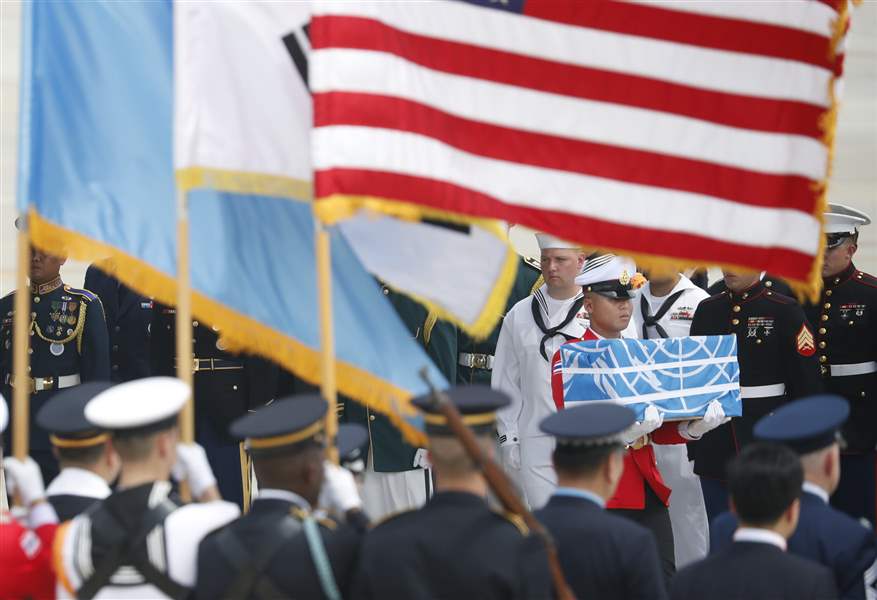
Diplomatic long game
8/1/2018
A soldier carries a casket containing the remains of a U.S. soldier killed during the Korean War, after arriving from North Korea at Osan Air Base in Pyeongtaek on July 27.(Photo credit should read KIM HONG-JI/AFP/Getty Images)
AFP/Getty Images/Kim Hong-Ji
Diplomacy takes time, and persistence can be rewarded, but the pace set by North Korean leader Kim Jong Un is putting U.S. patience to the test.
As a result of the summit between Mr. Kim and President Donald Trump, 55 boxes containing remains of U.S. soldiers missing from the Korean War were released to the United States.
Click here to view more Blade editorials
A U.S. military plane made an extremely rare trip into North Korea last Friday to retrieve the cases.
This is a very modest step. What, after all, could be easier for North Korea to do than to hand over boxes of remains?
The President and Mr. Kim had a face-to-face meeting in Singapore in June, which Mr. Trump was quick to tout as a tremendous success. He said that the nuclear threat was eliminated and that North Korea had agreed to return the remains of missing service members.
The former was overstated. So far, Mr. Kim has done little to trim his nuclear threat that he would not have done anyway.
But Mr. Trump was promised that the remains would be released, and so it appears Mr. Kim is living up to that promise — ever so slowly.
North Korea still has more than 200 more sets of remains in storage, and they represent a fraction of the approximately 5,300 U.S. soldiers who were lost in North Korea in the 1950-1953 Korean War.
It is believed that the remains of many more U.S. soldiers, and soldiers from other countries who participated under the nominal leadership of the United Nations, are still in in cemeteries and battlefields across the country.
Mr. Kim is squeezing every bit of diplomatic profit out of the sacred remains of American war dead. This is disgraceful and frustrating, but was predictable.
The North Korean regimes under Mr. Kim and his father before him have used the same strategy on a series of American administrations. Bombastic threats and escalating tensions are followed by dramatic, if not large or meaningful gestures, and many broken promises.
Mr. Kim and his inner circle are focused on keeping their grip on power and are playing the global relations game that has been successful in supporting this for decades.
Secretary of State Mike Pompeo, who has led U.S. efforts with the North Koreans — often personally traveling there to negotiate — certainly must understand and anticipate the moves Mr. Kim is likely to make. It would be easy to be frustrated by the lack of progress, but the U.S. must remain patient and take each small step forward as an opportunity to press for more.
Family members who lost loved ones have long wished for closure. For those family members who will be able to claim the remains when the identification process is over, the Trump administration’s diplomacy will have been a monumental success.
All of us are appreciative at this small step. Patience and vigilance extending over more than one presidential administration are called for here. The President should place appropriate, but not exaggerated, stock in this small diplomatic gesture by the Kim regime.